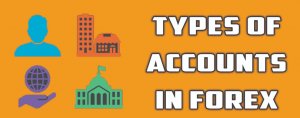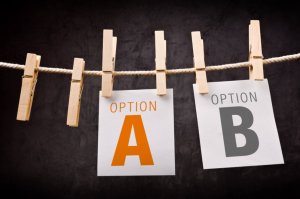There are a lot of different types of forex trading accounts to choose from. Many brokers have taken to offering multiple accounts with different conditions, rather than only providing one account. Having options to choose from can help traders to find accounts more tailored to their needs, for example, some accounts are better for those that want to deposit $100 or less, while other accounts focus on traders that are looking to make large investments. There isn’t a black and white answer about which account is best overall, as this largely comes down to one’s trading preferences. Below, we will cover everything you need to consider to choose the best account for your personal needs.
First, we will briefly provide an overview of the main types of forex accounts. Do note that some brokers may use different names, so think of this as a general idea of the accounts that are out there:
- Micro/Mini/Cent account: These accounts can usually be opened with a small starting deposit from $1 to $100 or so. The accounts typically allow the smallest trade size of one micro lot and limit the maximum trade size. These accounts are often targeted towards beginners and can be subject to higher spreads and fees. Sometimes, these accounts place limitations on the maximum account balance they can hold.
- Standard/Classic account: These are the most common type of trading accounts available and can usually be opened for $5-$100, although some brokers ask for a larger deposit of around $500. Most of these accounts offer a minimum trade size of either one micro lot (0.01) or one mini lot (0.1). These accounts often offer average spreads of around 1.5 pips.
- Premium/Platinum account: You might see different names for these accounts that often fall between Standard and VIP levels. These accounts typically require deposits of $500 or more, oftentimes in the thousands. Spreads and commissions are usually lower than average for these account holders and some brokers offer extra perks to these members.
- VIP account: This is the best account available. Brokers save the best perks and sometimes offer spreads starting from 0 pips with low commission costs as incentives. These accounts usually require large deposits of $5,000 to $20,000 or even more in some cases.
Deposit Minimums
The first thing you’ll need to consider is how much you’re looking to deposit. Unfortunately, many brokers offer the best conditions to those that can afford to make a large investment. If you only want to deposit $100 or less, your options will mostly consist of an account modeled after a Micro/Cent/Mini account or a Standard/Classic account. Those that want to start with a small investment will need to compare brokers to find the best account. If you don’t like the limitations for Micro/Cent/Mini accounts, you should be able to find a broker offering Standard or Classic accounts within your price range. Those that want to make a very large deposit should look for brokers offering better perks on their higher-tier accounts. You should expect to see low spreads and other benefits on these better account types.
Transaction Costs: Spreads, Commissions, and Other Fees
The spread is the difference between the bid and ask price. In general, an average spread is about 1.5 pips on the benchmark EUR/USD pair. If you see spreads starting from 2 pips or higher for a certain account type, then you know the spreads are higher than average for that account. Starting spreads from 0 pips are the best spreads possible.
Commission fees can often vary widely for different accounts. Some brokers might offer lower spreads, then offset those with higher commissions. Be sure to check these prices before opening an account so that you’ll be aware of all fees. Some traders prefer accounts with higher commissions and lower spreads and vice versa. If an account doesn’t charge commissions, it is easier to keep up with the cost of trading because that cost is built into the spread.
You also need to look at deposit/withdrawal fees. Many brokers will allow you to deposit for free, while others charge you for both deposits and withdrawals. It’s normal to see some type of fee but know that fee-free options are out there. You also don’t want to withdraw through a funding method with insane fees. Also, be aware that bank wire withdrawals often incur fees on the bank’s behalf.
Know that the brokerage fees will cut into your profits, so it’s important to find an account with lower fees. If you settle for high spreads and commissions, then you’ll also likely pay withdrawal fees – this will severely cut into your profits or take them altogether. Know that you shouldn’t settle for ridiculous fees simply because you don’t have a large entry-level deposit. Keep looking at different brokers instead.
Trading Platform
Available trading platforms usually depend on the broker in general, as a broker offering multiple platforms typically offers each platform to all account holders. MetaTrader 4 and MetaTrader 5 are the most popular trading platforms and are offered by most brokers. In some cases, Ctrader is another good option. If you see that the broker offers something different, it’s a good idea to do some research to ensure that the platform works well and that it isn’t too basic for your needs.
Asset Accessibility
Some brokers offer their entire range of assets to all account holders, while others are more limiting. For example, a broker might limit their Micro account holders to a lower number of currency pairs that don’t include exotics, while their VIP account holders can trade all currency pairs along with commodities and stocks. Some brokers also focus exclusively on currency pairs while others offer cryptocurrency and more exotic assets. If you’re looking to diversify your portfolio, you should know that it is possible to find entry-level accounts that support several different assets.
Conclusion
Opening the right account is as important as choosing a good broker to work with. When comparing trading accounts, you need to ask yourself these questions:
- How much am I looking to deposit? What type of account options will this get me?
- Does the account limit the maximum balance? If so, will this be a problem for me?
- What are the spreads and commission fees for the account? Are they above average?
- Which trading platform(s) will I have access to?
- What assets will I be able to trade?
- Will I have to pay to deposit/withdraw funds?
You should be able to find clear answers to all of the above questions before you ever give out any information or open an account. Comparing different brokerages is the best way to get a better idea of what your starting deposit can get you. It’s also a good idea to look for a broker that you can grow with. You might only want to invest a couple of hundred dollars right now, but you might want to invest more in the future. This is why it’s a good idea to look for a broker that you can grow with so that you can eventually move up to a better account.





